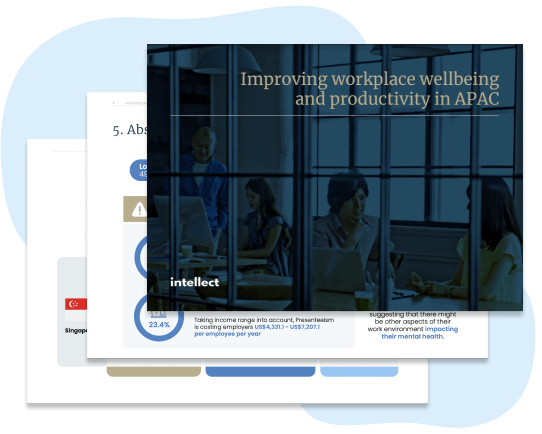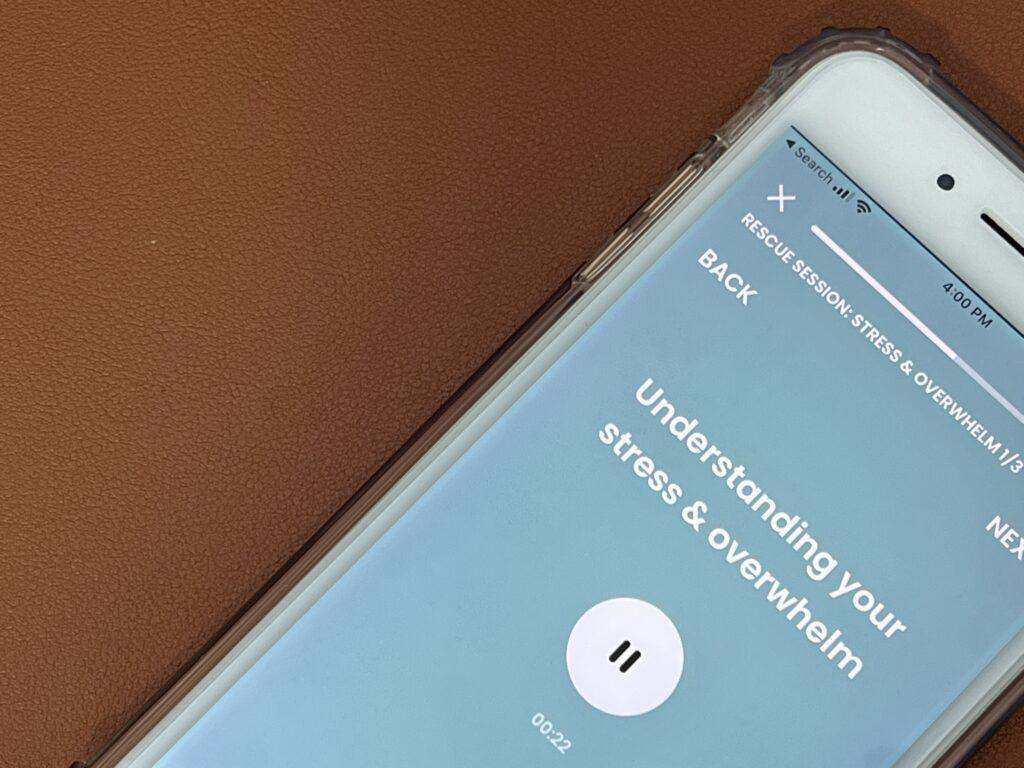Even though mental health is still seen as a taboo topic in some Asia-Pacific countries, the onset of COVID-19 has brought about an urgent need to address it. Lockdowns in various countries took a toll on people’s mental health, prompting organisations to prioritise employee wellbeing so “The Great Resignation” may be averted.
Triggers of poor mental health
To better guide companies, Intellect ran a survey for over 880 respondents in seven APAC countries. Employees across the countries surveyed showed an ongoing struggle with sleep, with 51% and 67% of respondents reported feeling stressed and anxious respectively. Employers and employees need to work together to alleviate these as mismanaging them could lead to burnout – a state of exhaustion that 8 out of 10 respondents reported experiencing.
Burnout could show up as fatigue, insomnia, as well as feelings of sadness, anger, and irritability. Without healthy coping mechanisms, one may turn to alcohol or substance misuse, causing their physical health to deteriorate in the long run. These have the power to turn their personal and professional lives upside down, impacting their functioning at home and in the workplace. Naturally, employers may observe poor decision-making, high turnover, and lowered productivity.
Despite the easing of COVID-19 restrictions in many countries, burnout continues to be a threat to both individuals and organisations. When McKinsey ran a study in early 2022, they found that nearly 1 in 3 employees in Asia experience symptoms of burnout, compared to 1 in 4 in other regions.
Based on Intellect’s findings, about 15% reported experiencing poorer mental health. When asked about the main areas that employers can support them in, 17.45% cited work-life balance and 16.7% cited learning and development opportunities. The latter, in particular, helps to assuage concerns such as job security and disengagement for both employees and employers.
What are the most prevalent struggles in your country? Download Intellect’s ebook to find out.

How to address stress triggers
Now that we are aware of the major stress triggers among employees, what can employers do to address them?
Promote anxiety and stress management

Companies can make use of various channels to help employees manage their stresses and anxieties. A straightforward way to do so is to offer access to trained counsellors and coaches, and companies can choose to partner with clinics or work with virtual counsellors.
During the pandemic, ShopBack saw that their employees were experiencing anxious thoughts, isolation and distress. To offer support, the company partnered Intellect to provide personalised coaching and on-demand rescue sessions for about 700 employees.
“Through our partnership with Intellect, we are heartened to see more of our colleagues being intentional about their own mental wellbeing,” said ShopBack’s People Experience Lead Alex Teo.
Aside from counselling and coaching, companies can also opt for services that send reports on issues and improvements, so that they can better understand their employees’ concerns. Every individual has their own unique concerns and worries, so it’s important for companies to know what their employees need before coming up with solutions.
SaaS cybersecurity company Horangi was looking for a mental health solution for employees who were transitioning to remote work during the pandemic. With Intellect, the company’s management team received insights on their workforce’s wellbeing, allowing them to implement strategies and track their progress.
For Tech in Asia, personalised support offered to individuals can benefit other employees, too. Through coaching, a team member who had difficulty focusing on deep work amid the onslaught of virtual calls was encouraged to practise time-blocking – a recommendation that got picked up by others.
“I benefited from the same advice as well,” said CEO and founder Willis Wee. “This shows how one piece of advice from a coach can really cut through the organisation, where it really helps leaders and team leaders to benefit.”
Actively engage employees

Forbes defines employee engagement as an employee’s emotional commitment to an organisation and its goals. Naturally, stress and burnout are its antithesis.
In caring for employees, organisations have been rolling out initiatives such as mental health days, which offers paid time off to recharge; and flexible schedules that help employees to be fully present when they show up. Google, for instance, has introduced Focus Days.
“These are days where we try to limit the number of meetings so that we can focus on doing work or even connecting with each other in real life,” says the company’s Global HR Operations Director Gilberto Gaeta.
Microsoft also has their way of offering flexible work schedules. “For us, we made it clear that there were three particular dimensions where we can be a bit more structured, which is the employee’s work location, the employee’s work time – so whether he’s part-time or full-time, because that may adjust – and also the employee’s frequency of showing up in the office,” said Jan Philippe Tanchi, the Senior HR Consulting Manager of Microsoft APAC.
Apart from HR policies, it’s also important for supervisors to check in on their teams regularly. After all, some employees may find it difficult to broach the topic of mental health, so supervisors should look out for signs of burnout before it’s too late.
Some signs that managers can keep an eye out for are drop in work quality, increased absenteeism and reduced involvement in team activities. Here are some tips on how to coach employees who are on the verge of a burnout.
Improve organisational behaviour

Organisational behaviour is fundamental to company culture, and the simple act of recognising an employee’s contribution is telling of how much employers value their workers.
At McDonald’s, the RICO framework – Recognising Individuals Consistently and Openly – is practised intentionally.
“Once you start recognising, you give people that sense of empowerment that, ‘Hey I can do something good’ … And then instead of having the fear of doing something wrong, (they’ll) have the motivation to do something right,” shares McDonald’s Singapore’s Managing Director Benjamin Boh.
Promoting work-life balance is also imperative in improving organisational behaviour. Working after hours may be inevitable for certain industries, but that’s not to say that boundaries can’t be set.
Journalist Edoardo Liotta shares that his company, Rice Media, has a culture that limits communication after hours. But for shoots that happen on weekends or evenings, there are systems in place where employees get compensated in the form of time-offs. “So we try to mitigate where we can. In that sense also, you don’t overly normalise it because, you know, you give and you take,” said Edoardo.
Improving organisational behaviour also involves helping workers grow professionally. Companies can do so by providing individuals with learning and development opportunities, or exploring other possibilities within their careers.
Besides signing up for professional courses, employees can also take up personalised job coaching that helps them better understand their strengths and areas for improvement.
For example, workers can co-create a customised action plan with Intellect’s career coach to reach their goals. They’ll also be able to learn new skills to cope with personal challenges and confidently manage stress. Find out more about Intellect’s coaching services.
Empowering your employees
Empowerment is the first step to helping a workforce that’s struggling with stress triggers. There is no one-size-fits-all solution, but understanding the patterns of your country could be a start. Download Intellect’s e-book to find out what are the gaps and solutions specific to your country.








